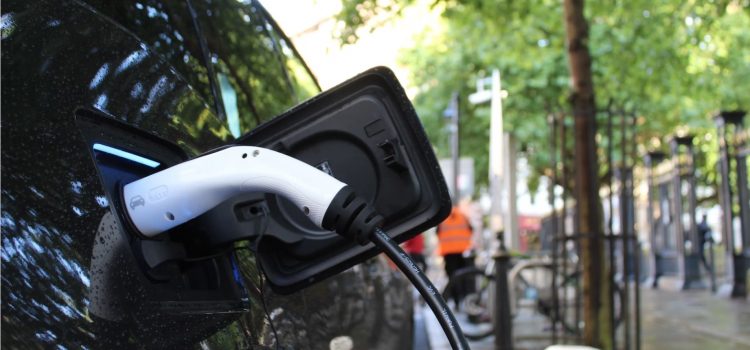
This is a free excerpt from one of Shortform’s Articles. We give you all the important information you need to know about current events and more.
Don't miss out on the whole story. Sign up for a free trial here .
How will the Inflation Reduction Act affect electric vehicles (EVs)? Which EVs are eligible for the tax credit?
With a $7,500 tax credit for the purchase of an electric vehicle, the Inflation Reduction Act aims to encourage more people to buy EVs, especially those made with U.S. resources. However, the bill creates difficulties for Asian and European car manufacturers for whom the U.S. market is essential.
Keep reading to learn more about what the Inflation Reduction Act means for electric vehicles.
The Inflation Reduction Act & Electric Vehicles
The Inflation Reduction Act passed by the U.S. Congress in August includes a $7,500 tax credit to encourage people to buy electric vehicles (EVs), especially those made with U.S. labor and raw materials. But while it sounds straightforward, not everyone is happy with the plan. So, what does the Inflation Reduction Act mean for electric vehicles? Here’s how it works: According to the Inflation Reduction Act, electric vehicle purchases can qualify for the full credit or a smaller $3,750 credit, depending on how well the cars fulfill the following requirements:
- The final assembly of the vehicle is done in the U.S., Canada, or Mexico.
- Vehicle prices are capped at $80,000 for large vehicles such as SUVs and $55,000 for small vehicles.
- The buyer’s income is no more than $150,000 a year or $300,000 for married couples.
- Raw materials such as battery minerals don’t come from “foreign entities of concern,” namely China, Russia, and Iran.
- 50% of the value of the battery’s components is sourced from the U.S. Critical minerals can be sourced from the U.S. or a country with which the U.S. has a free trade agreement, or recycled in the U.S., Canada, or Mexico.
More restrictions are to be phased in during 2024 and 2025 to gradually increase the percentage of materials sourced in the U.S. as well as local job creation.
Who It Benefits
The Inflation Reduction Act’s advocates argue that the tax credit will benefit U.S.-based electric vehicle businesses, from mining to manufacturing. In fact, U.S. car manufacturers have reacted positively to the tax credits.
GM and Ford are both making moves to ensure their EVs will be eligible for the tax credit–Ford has even begun building a battery plant in Kentucky to that end. Tesla, too, has come out in favor of the credit, despite early opposition: The company initially expressed concern that the credit would benefit its competitors more than itself, but more recently has praised the legislation as consistent with the company’s mission.
In addition, U.S. mining and manufacturing companies are happy that the credit will strengthen the North American battery supply chain by reducing its dependence on China, which produces over 50% of the world’s minerals needed for EV batteries. (They acknowledge, however, that building a resilient supply chain will take time: It takes over a decade to bring a new mining company to production, so U.S.-based mining companies will not be able to supply local producers for a while. In the meantime, manufacturers will have to rely on Canada, Chile, and the Democratic Republic of the Congo.)
Who It Hurts
However, despite its positives, the Inflation Reduction Act creates difficulties for Asian and European car manufacturers for whom the U.S. market is essential. The Japanese government commented that “friendly nations” have been working together to build resilient supply chains without reliance on China, and that the Inflation Reduction Act’s focus on North American electric vehicles undermines that work.
Further, Asian and European representatives argue that the bill breaks a World Trade Organization rule forbidding countries from discriminating against or among imports. It also violates a rule on subsidies by making the credit dependent on the product being manufactured in North America. It’s likely that the U.S. will be sued in the WTO by the EU, Korea, and Japan and lose, but it’s unclear how the conflict will be resolved as both parties have recourse for appeals. Ultimately, the biggest hit the United States takes might be to its credibility as an upholder of international trade rules.
Hyundai Isn’t Happy
Perhaps most concerned is South Korea, whose flagship car manufacturer Hyundai produces the second most popular EVs after Tesla. But the restrictions requiring U.S.-based manufacture leave all current Hyundai cars out of the tax credit.
Hyundai has a powerful bargaining chip, however: It’s recently begun construction of a $5.5 billion factory in Georgia that’s expected to generate over 8,000 jobs. South Korea’s ambassador said the tax credit’s implicit exclusion of current Hyundai cars is unfair, considering the company’s ongoing investments in the U.S. They have an ally in Georgia Senator Raphael Warnock (D). While he stands by the Inflation Reduction Act, Warnock has introduced another bill pushing back the date on which electric vehicle tax credits would take effect. If Warnock’s bill passes, it would give Hyundai and other foreign companies more time to meet requirements.
What’s Next for Electric Vehicles?
As the U.S. Treasury writes the rules for the new legislation, Treasury Secretary Janet Yellen has made clear that its job is to implement the legislation as written, and there isn’t much room for accommodations or exceptions. Some argue that foreign manufacturers will simply have to adapt by meeting the requirements found in the Inflation Reduction Act or by making their electric vehicles affordable enough that they remain eligible for the tax credit.
It Depends on Batteries
The materials needed to make batteries are expensive and in limited supply. Recycling will help manufacturers maintain access to these materials, and will lower costs—sourcing materials from used products is often easier and cheaper than extracting them from the ground.
This will become even more important as global demand for raw materials skyrockets and companies (and countries) without their own supplies struggle to source them. Some analysts forecast that demand for battery materials will exceed supply in less than three years, leading to a crunch that might echo the oil embargo of the 1970s that sent prices soaring. Exacerbating this would be the fact that such a crunch would be prolonged—while it’s easy to quickly “turn on” oil spigots, it’s not so easy to find, mine, and extract cobalt, nickel, or any of the other rare metals used in the manufacture of EV batteries.
For this reason, several countries, including China, are developing robust recycling programs. U.S. officials warn that without investment in such a program, the country risks falling behind in the coming decade.
U.S. Governmental Response
The Biden administration has signaled support for the electric vehicle industry, setting a goal for all new cars to be electric by 2035. It has earmarked money for upgrades to the country’s aging electrical grid and for the building of a national charging network. It’s also put some money aside to develop a battery recycling program.
Critics say the budget doesn’t go far enough, but they acknowledge it’s a decent start. Naturally, of course, any governmental efforts can only ever be a start—the rest will be up to car manufacturers, who are, prompted by unleashed consumer demand, highly incentivized to meet the challenges facing the industry.

Want to fast-track your learning? With Shortform, you’ll gain insights you won't find anywhere else .
Here's what you’ll get when you sign up for Shortform :
- Complicated ideas explained in simple and concise ways
- Smart analysis that connects what you’re reading to other key concepts
- Writing with zero fluff because we know how important your time is






